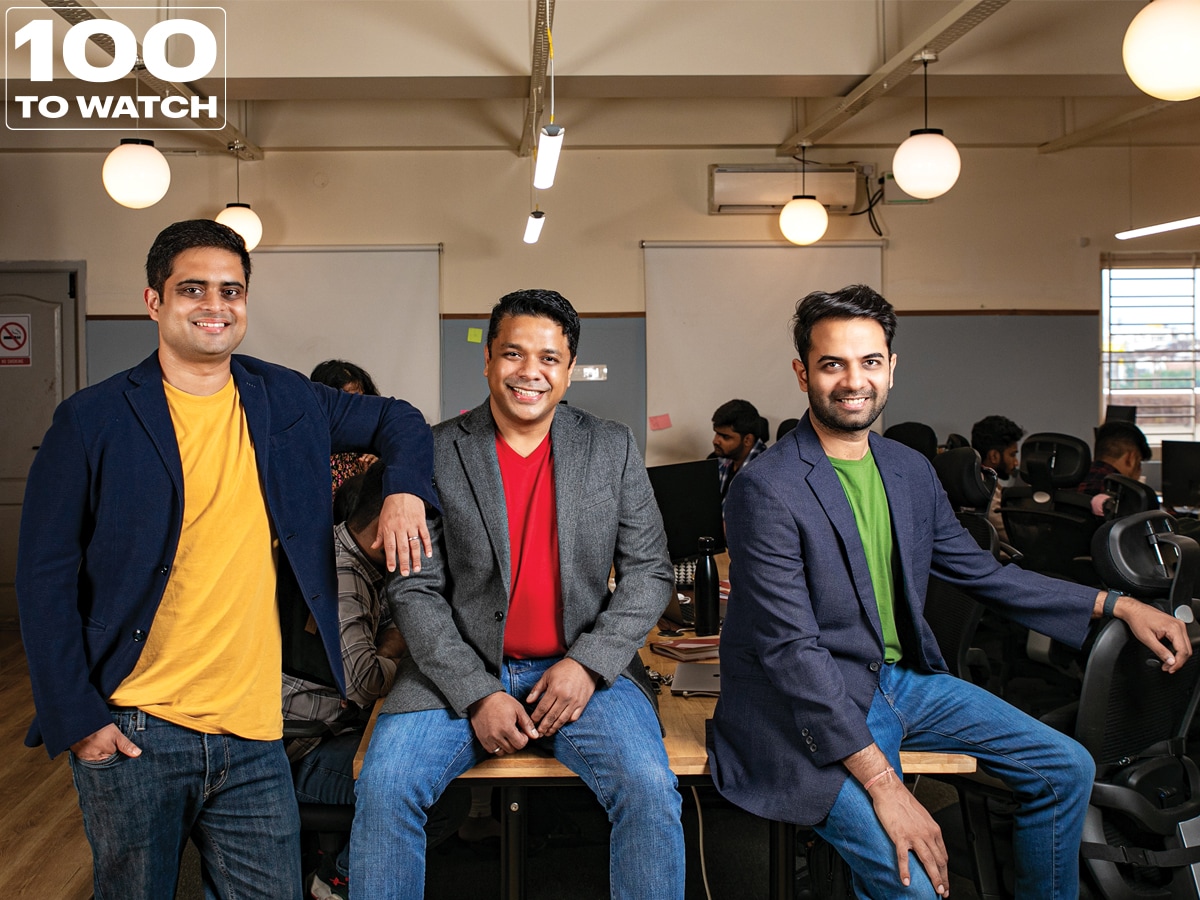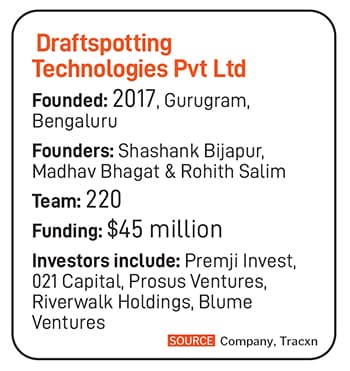 (From left) Rohith Salim, Shashank Bijapur and Madhav Bhagat founded SpotDraft in 2017
(From left) Rohith Salim, Shashank Bijapur and Madhav Bhagat founded SpotDraft in 2017
Image: Selvaprakash Lakshmanan for Forbes India
If the Google for Startups accelerator spotted your startup (pun intended), it probably means you’re onto something, right? The founders of Draftspotting Technologies think so too. They were among the 20 or so startups picked by Google for that programme, in July.
Better known as SpotDraft, which is also the name of their flagship product for contract life cycle management, this company is seeing itself evolve, especially this year, to provide higher value features to customers.
SpotDraft helps businesses create, manage, analyse and collaborate on contracts. Using its cloud platform, companies get to put together business contracts faster. And that’s the core value of the platform—streamlining the legal aspects and making the contracting process better.
“The time from quote to cash is being sped up,” Shashank Bijapur, co-founder and CEO, tells Forbes India. “The shift that happened in the last one year is that we went from a legal operations setup to a substantive legal analysis tool.”
Today, companies can ask SpotDraft to go through a contract, automatically redline it, and come up with what’s good and which portions need more scrutiny or revisions and so on. Redlining refers to the process of marking out portions of contracts that need further careful scrutiny.
 Now, instead of spending hours reading and redlining contracts, businesses can quickly use SpotDraft to determine, based on their internal guidelines, portions of the contracts that are fine, and those that need more work. And the platform further makes recommendations on how to tackle the areas that need work. “So, it’s taken that role of a lawyer and it’s made it fully end-to-end automated,” Bijapur says.
Now, instead of spending hours reading and redlining contracts, businesses can quickly use SpotDraft to determine, based on their internal guidelines, portions of the contracts that are fine, and those that need more work. And the platform further makes recommendations on how to tackle the areas that need work. “So, it’s taken that role of a lawyer and it’s made it fully end-to-end automated,” Bijapur says.
Aptly, they call this allied product Verify, which helps with contract review. In-house legal teams spend an inordinate amount of time reviewing contracts because that is where a lot of the risk would be hidden, says Madhav Bhagat, co-founder and CTO.
The value of Verify is that it helps lawyers in checking a contract “without them having to read it first”, Bhagat says. “In fact, there is a feature in it where it will automatically make edits to the contract to make it compliant with the customer’s guidelines.”
For example, when they tested Verify on NDAs (non-disclosure agreements), more than 80 percent of those NDAs didn’t go through any human edits after changes suggested by Verify, he claims.
Verify and SpotDraft also do “multi-hop reasoning”, he says. This means different parts of the contract might be talking about the same thing, but one needs to read all of those together to understand if the whole contract is compliant or not with a business’s guidelines.
Today, SpotDraft has more than 450 customers from around the world, Bijapur says. “And we have a staff of 220 and we’re actively hiring for a range of positions,” he adds.
The significance of what SpotDraft is attempting is that putting together contracts for businesses around the world is a multi-billion-dollar market. It’s also one where currently much of the work is done by human lawyers who bill by the hour at rates that can range from $900 to $1,200 an hour, in the US, Bijapur says.
And when large language models (LLM) and generative AI (artificial intelligence) came to the fore, SpotDraft’s founders were ready to tap them. A significant portion of the features they’ve developed is possible because they can now tap LLMs—both proprietary and open source.
“We use long context windows that have become common now to pass full contracts to the LLMs to get answers that might depend on different parts of it,” Bhagat says. As an example, consider that a particular clause in a contract might say a certain action is allowed or legal, but now, SpotDraft can tap LLMs in such a way to show that, actually, what is allowed under that clause is legal only under certain other conditions explained elsewhere in the contract.
Customers get a more accurate picture, based on relevant context.
Two trends with respect to the LLMs are relevant here. One the cost is going down, Bhagat says, especially for the older models. Second, on the cutting edge, companies such as OpenAI are focusing more on the reasoning capabilities of the latest models and the ones to come, he says. This all means, for specialist end-users such as Spot Draft, their products and platforms too can become ever more sophisticated and continuously automate more of the tasks and functions that take human professionals today.

On the commercial front, “at least for our core product, we are past the product market fit”, which is SpotDraft, Bijapur says. The more AI-based new features are work in progress. Leading up to getting selected for the Google accelerator programme, SpotDraft had already picked up well-known backers, including Premji Invest, the family office of Indian IT billionaire Azim Premji, 021 Capital, a firm backed by Flipkart co-founder Binny Bansal and investor Sailesh Tulshan, Riverwalk Holdings, Prosus Ventures and Blume Ventures.
These firms invested $26 million in SpotDraft’s Series A funding round that ended in December 2023. Overall, the Gurugram-registered, Bengaluru-headquartered startup has raised some $45 million in funding as of end of October.
“Their ability to continuously innovate on the product and also the quality of product… on both these counts, they really stand out,” says Tulshan, founder of Xeed Ventures. “They’re one of the fastest growing SaaS businesses from India right now.”
Product companies from India today are beginning to change the software landscape, he adds. “They are no more building services businesses, and the founders are getting more audacious in building products that aren’t competing on cost, but on the quality and sophistication of the products.”
As for SpotDraft, sustaining the quality of their team as they become bigger will be one of their biggest challenges, he adds.
With respect to sales, Bijapur wouldn’t provide a specific number for annual recurring revenue, but “we have nearly tripled from last year”, he claims. The company is investing in growth, at this point, but “next year we should be looking at Ebitda positive”, he adds.
(This story appears in the 15 November, 2024 issue
of Forbes India. To visit our Archives, click here.)
